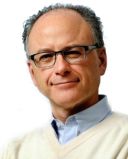Leadership
What College Graduates Need to Do First—and Other Lessons
I like to learn from smart people. Here's what John Williams can teach us.
Posted July 21, 2016

John Williams, the President of the liberal arts school Muhlenberg College, has been a transformative leader throughout his career. From the Kent School (CT) to Amherst College, Harvard Law School and Harvard Business School, to a professional career that included leading the consulting division of Eduventures and serving as a partner in The Bridgespan Group, John has been all about impact. He’s been outspoken on the financial challenges to universities, campus politics, and race relations. I wanted to know how he got to where he is, and what advice he can share not only for college students, but for all of us. Here are the four questions this week:
Sydney: What did you learn in the corporate world, either as an executive, a consultant, or an entrepreneur, that has been most useful in academia?
John Williams: There are many dimensions of a college that have the nature of a business. For example, all the facilities-related challenges, the management of human resources, the management of the finances, etc. So, my experience as an executive comes into play in these areas. My experience as a strategy consultant certainly applies to strategic thinking about many of the critical competitive choices facing Muhlenberg. My experience as an entrepreneur has prepared me to think and act in an agile manner and to be open to new ways of thinking about long-established processes.
I would say there’s another dimension of my experience that people underestimate when they classify me as a businessperson: my training in the academic culture and shared governance earned through spending the past 32 years engaging with faculty and senior administrators at Amherst College, and at other colleges and universities with whom I’ve worked in a consulting capacity.
What I am finding most useful is my ability to draw upon all of this experience, across all of these dimensions, in addressing Muhlenberg’s opportunities.
Sydney: What should young people do to increase their odds of getting a great job right out of college?
JW: First, as they go through the first year or so of college, students should look deeply within themselves to develop a clear sense of who they are, what interests them most profoundly, and what motivates them to exert their best efforts. They need to identify their purpose in life. This process sounds simple, but it can be incredibly difficult. Once accomplished, however, the rest is comparatively easy. Next, they should find career options that best fit their purpose and the interests about which they are the most passionate. Once they identify their target career options, they should get advice from others already pursuing those career options successfully, both to confirm their interest and to learn what it really takes to achieve success. Then, they should shape an academic course of study and a set of co-curricular activities that will permit them to follow the path to success. At every stage and throughout their careers, they should recruit mentors and advisors to help them sort through the many life and career choices.
Sydney: What do great leaders do that others don’t do?
JW: First, great leaders have a clear vision of where they want to go. They gather around them smart people who are aligned with and motivated by the organization’s mission and who share the organization’s values. Then, they do a great deal of listening. They inspire their teams by working collaboratively with them to shape goals and policies that are truly worthy of their combined efforts and fully aligned with the organization’s mission and values. They weave together the thinking of the team, adding their own creative and innovative ideas as well. They focus on effective implementation and execution to get the job done. They reward their team members for their performance and recognize and praise them in proportion to their contributions.
When the challenging moments come along, as they inevitably do, great leaders have the grit and determination to work through the challenging times and lead the team through to the other side.
Sydney: Who helped you along the way? Share a bit about one of your mentors who made a difference in your life.
JW: One of the people who helped shape me early on in life was one of my teachers at Kent School, the late William H. Armstrong. Bill Armstrong, author of both Sounder and Study is Hard Work, was a giant of a man; not so much in physical stature, though he was a strapping, muscular man with a clean-shaved head. He was a man blessed with a giant character and he was born to shape young men. As a third-form (9th grade) male student at Kent, I was required to take Mr. Armstrong’s course in Ancient History. In reality, it was a course in study skills, or so they said. In actuality, it was a course in taking responsibility for one’s own level of effort and standard of excellence. To set the tone in his classroom, Mr. Armstrong had a sign next to the door with a quote from the Greek poet Hesiod, dating back to approximately 700BC: Before the Gates of Excellence, the High Gods Have Placed Sweat.
On the surface, Mr. Armstrong was as close to an Army drill sergeant as one can get without joining the Army; but he had a heart of gold. His idea of effective studying was to first skim the material, then develop a set of questions or hypotheses about it, then (and only then) read the material, go back and recite key sections, and then go back and review the material once more. Only then, in Mr. Armstrong’s view, would you have effectively studied the material.
When I excelled in his class and made the High Honor Roll, Mr. Armstrong took me under his wing and coached and encouraged me through all of my four years at Kent. He was the most impactful teacher I’ve ever known, and shaped my approach to life in many ways.
------
These are great lessons on leadership. John Williams has quickly applied what he's learned in an eclectic and productive career to higher education, and it won't be surprising to me if he becomes even more of a national leader in higher ed as a result. Let me end with one last word from John:
"I think the presidency of Muhlenberg College is a wonderful opportunity for me to apply what I’ve learned and experienced in all aspects of my career to date to the transformation of students’ lives today. I can’t imagine anything more fulfilling than that."




